Pradeep Kumar Gyawali, the Foreign Minister of Nepal, is also one of the influencing leaders of the ruling Nepal Communist Party (NCP). A leader with good intellectual backup, Gyawali spoke to Khabarhub on various issues ranging from Millennium Challenge Corporation (MCC), Indo-Pacific Strategy, the dispute over Kalapani, and the Sagarmatha Sambad.
Following are the excerpts from his interview with Khabarhub:
It is said that the issue of MCC is in a difficult situation in the Nepal Communist Party (NCP) Secretariat. What is going on with MCC? Is it going to be ratified from this session of Parliament?
I firmly believe the current session of the parliament will ratify the MCC Compact. The government had already tabled it for discussion in the previous session of parliament. In a democratic system, discussions on the democratic parties are not unusual. It makes us more cautious and helps in taking the message to all circles. However, while discussing, we have to think about 2-3 things more precisely.
Firstly, the discussions should be fact-based and logical. They should not be biased. Secondly, the discussions should not have an adverse impact on our friends and partner countries. Next is that the development priorities should not be shadowed by our personal and petty interests.
Last but not least, the leadership of the ruling party should show the level of maturity required in such instances. We have to take care of these aspects.
I find some of these facts missing in these instances. Concerning the disputes these days, there are fewer facts and less logic. One can smell foul in such discussions. Yet, one has to remember that constructive and creative arguments lead to fact-finding or truth. I am hopeful that this most-sought grant will be ratified.
But it is argued that it’s a wing of the Indo-Pacific Strategy?
This, in fact, is humorous. I have openly said it many times that there is no such nexus between the two. Former US President George W. Bush announced Millennium Challenge Corporation on March 14, 2002. And in 2004, both Houses of the US — the House of Representatives and the Senate — both approved the fund as an independent entity. The MCC has criteria for providing the grant.
Not every country aspiring is eligible to get it. We became eligible after the peaceful settlement of the decade-long conflict. There are nearly 20 indicators set. Nepal bagged the grant after an effort of 6-7 years.
Were the previous governments associated with the MCC process?
Six Prime Ministers of Nepal are somehow associated with it. While selecting the project, we should know what our priority is, which project can gear up our development. Based on independent research, we felt there is the energy crisis in Nepal, we have the potential on energy generation as well.
So, we decided to go for the project focused on infrastructure building in the energy sector, i.e. expansion of the transmission line. Provided we managed to generate energy and export it to the neighboring market, it can bring big impetus in our economy.
Grounded on these two realities Nepal selected the road expansion and cross-border transmission line connectivity project for the MCC grant. Indo-Pacific Strategy was not conceived until these things were done.
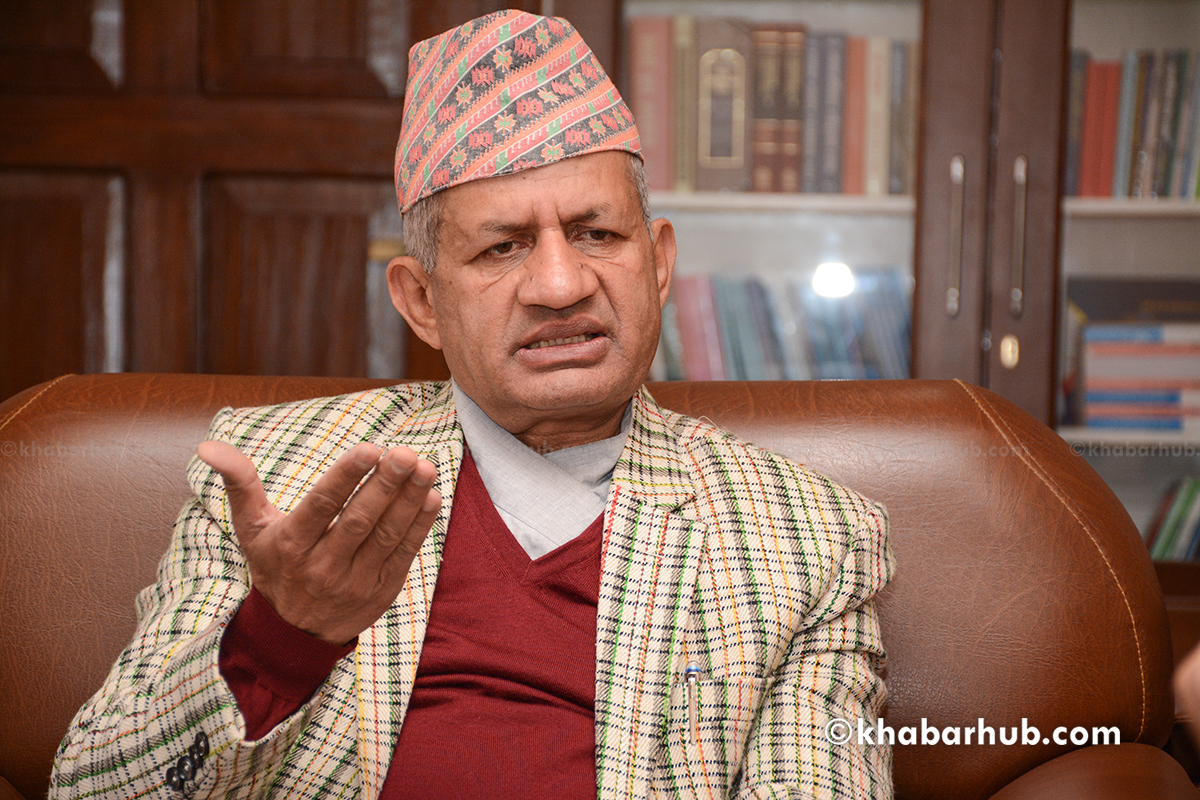
We signed the agreement in September 2017. In November, President Trump put forward IPS. That one is the US strategy through which it looks at the world. It deals with the USA’s global expectations, ambitions, and strategies. We know the strength and weaknesses of those strategies.
But, these issues related to development are different things. What some US staff or personnel say at the backdrop does not matter much. We have to consider what conditions and facts we regarded as the fundamental ones at the time of agreement matter most.
Reckless argument and irrational comments on such a project which can trigger Nepal’s development affirmatively might tarnish our image and turn counterproductive for the country as well. Such an argument questions our maturity.
We may not agree with all the strategies of powerful nations, we need not do that as well. We are free. Nonalignment is at the heart of our foreign policy. We will never be part of any activities against Non-alignment policy. This does not mean, we should never accept any grant from any power nations or we will never deal with them.
Here lies the loophole, I think. We hear MCC is supported only by the minority of the Secretariat.
Unfortunately, in media too, investigative journalism is declining and assumption-based journalism is mushrooming. Media’s image is also tarnished by the news which quotes and says the person told under anonymity. How can you trust the news from unidentified and unverified sources? They write the news with different intentions. It is not good to analyze the issue based on such sources.
I told earlier, this is not confined to a single party alone. Six of our PMs are associated with it because, in the past, no government of the past signed the agreement on behalf of the party. They signed on behalf of Nepal. I believe that our senior leaders will understand it.
So, you mean the government is clear, it should be ratified from the parliament. What about the Kalapani issue? What’s going on in this matter?
Regarding Kalapani, I think, you know what we have done after the issue came to the front. I don’t want to repeat it. On behalf of the Nepal government, we have made our position clear. There is no doubt that Kalapani belongs to us; international borders cannot be changed unilaterally. The country is one of these issues. This is great energy.
We have sent the diplomatic note mentioning our position clear on the issue. India has responded that we are ready to settle the dispute through dialogue.
Both sides are working for a convenient date and time for discussion. I believe, in terms of the historical documents, facts, maps, experts’ opinion, historical development international norms and values, these all are in our favor. We can, we should and we will settle the dispute, I believe.
If history has assigned us any responsibility, we have to face and bear the responsibility. Provided such disputes are not addressed, they may smear or let’s say paralyze the harmonious relationship. I believe, we can resolve it.
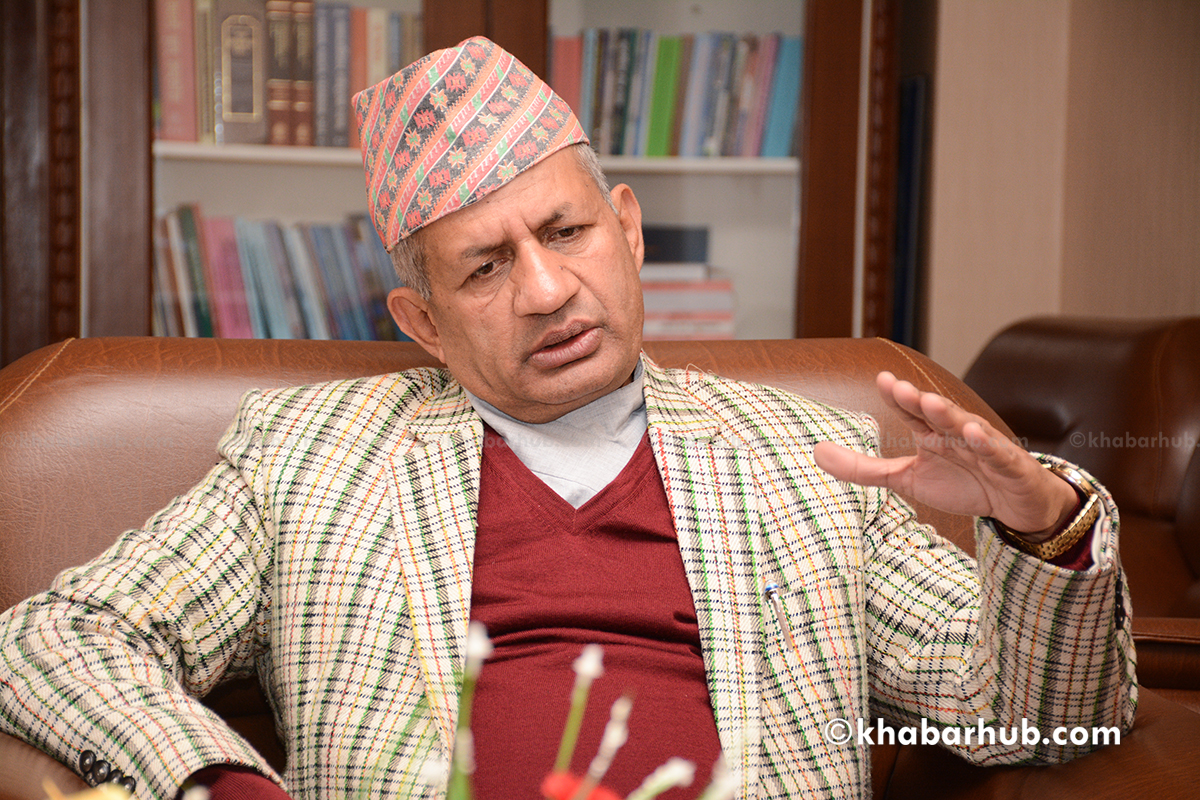
Lately, an incident occurred in Middle-East. I mean the death of Iranian general in US strike and Iran’s retaliation. There are some Nepali working in Iran, Iraq and other countries that are likely to be influenced by the incident. How are the Nepali there?
Definitely, we are worried about the scaling tensions in golf countries. There are more than 1.5 million Nepali working in that area. The impacts of the tension may spread outside the gulf countries. So, when Iran signs. We are for Non-proliferation treaty.
When the tension went on rising, the US withdrew itself from the treaty, and lately, Iran had been saying why it should alone follow it.
After Soleimani’s killing, Iran has declared its withdrawal. We are observing all the latest development. Our diplomatic missions and the Ministry of Labor are working in close coordination with each other.
We have asked our citizens to abide by the mission’s circular. We have approached the government there and the US government as well to address the prospective crisis. We are working our best to rescue them provided our citizens to go in a crisis.
What’s happening about the Sagarmatha Dialogue? What is it?
Sagarmatha Dialogue is a highly esteemed flagship program of the Nepal government. We are planning to raise the international and regional issues of our concern in front of the head of the states of different countries, the scientists, researchers, experts, and private sector together, so that it can contribute in policy formation and also help in making general consensus in such issues of multiple concern. We want Nepal to lead such issues through a permanent forum, we want to handle Sagarmatha Dialogue through it.
As the first edition of this campaign, we are planning to hold an international dialogue on Mountains, Climate Change and Future of Humanity in April. We have initiated the internal preparation required for it. We have sent an invitation to many countries.
Some heads of the governments are also taking part in it. There will be ministers, experts, UN Agencies, Private Sector, and Campaigners who are closely related or interested in the issues of climate change and its impacts.
Mainly, countries in the Hindu-Kush region, where there is the longest mountain/ Himalayan range face serious threats from climate change. It is getting late to take substantive steps for correction of the course. The melting of the mountains causes the sea level to rise.
Many countries located at the seaside are likely to suffer a lot. It is likely to create alarming threats to all. Our economy is based on agriculture, agriculture is based on monsoon. Our water stores will be impaired badly as well.
What is the Sagarmatha Sambad focused on?
This year’s theme is focused on Climate Change. We organize it every two years. Sagarmatha Sambad as an institute is of permanent nature. The theme will be different every two years. Maybe next time the agenda will be the economic one.
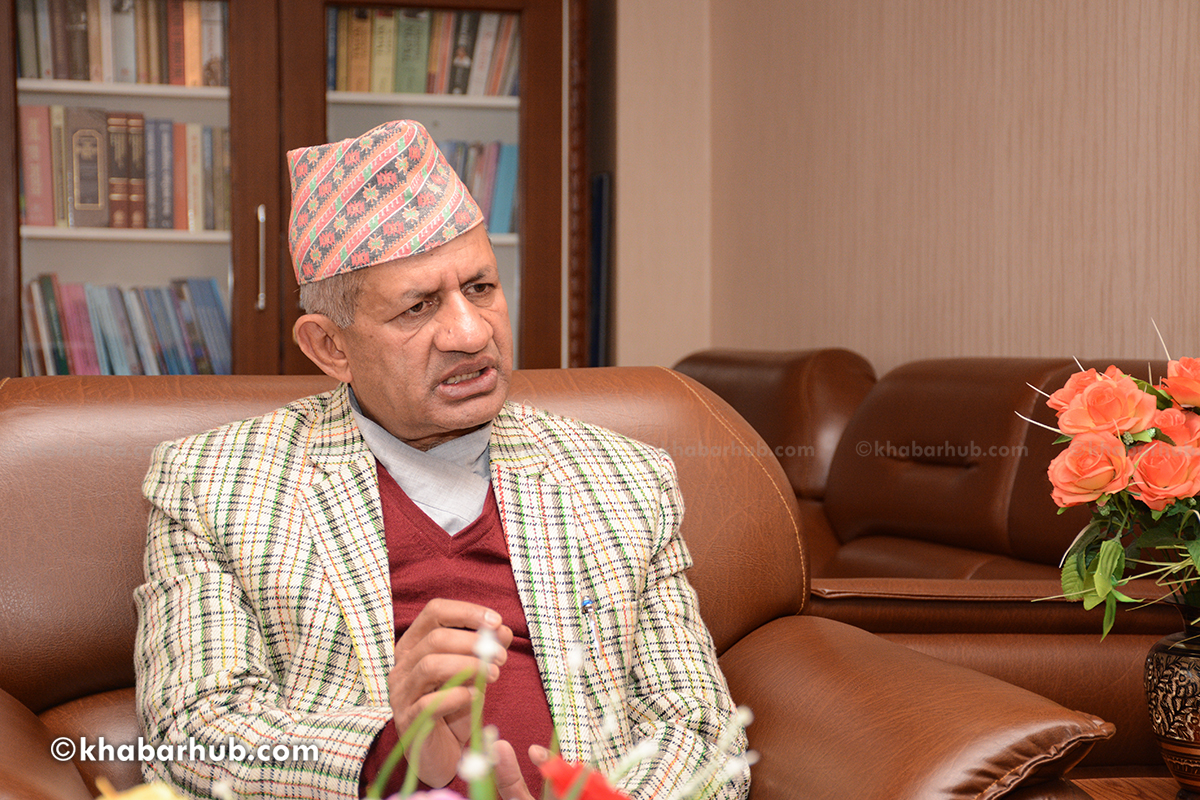
Although you are regarded as a successful Foreign Minister, do you have anything that you planned to do but somehow are not satisfied with as you were unable to do them? Have you felt any difficulties in the execution of the responsibilities? What are your plans?
Within the prevalent context, I think I have done my best for the successful accomplishment of my responsibilities. The tasks of foreign ministries are to be operated considering two things: how is everything going on inside the country, and what’s happening outside the country.
What’s happening outside is no within our control, we can try to impact, but with the existing global architect, we cannot make a big impact right now. We are working in the right direction though. However, when the external issues are likely to impact us, we should work actively for it; as in the case of the climate change issue. In the case of the internal issues, the machinery has to be mobilized impact-fully as one unit.
What is your strategy for the enhancement of bilateral ties with the neighboring countries other countries, EPG report?
I am satisfied with our relationship with our neighbors. The Nepal-India relationship which had reached the poorest level ever during the time of the proclamation of the constitution is brought back to substantively economically rewarding situations.
Lately, whether it’s a cross border petroleum pipe-line extension or establishment of integrated check post or the post-earthquake reconstruction of the infrastructure or the development of internal water-transport, or the trade and transit treaty, etc. whatever we have tried to do, we have tried to take the relationship ahead founded on economic prosperity. Border dispute in some places is the historical wound transferred till our time.
Our relationship with China has also been very dynamic. President Xi’s visit to Nepal, China’s commitment to enhance economic partnership with China.
Our external relations, in low profile for a long time, have got a new life. The power nations are interested to establish a relationship with us at a different level. President’s visit, PM’s visit to France and other countries in Europe, the Foreign Minister’s US visit the first-ever in the last 15 years, Foreign Minister’s first-ever in 16 years visit Russia, etc. show our brightening image at international level.
In the case of EPG report also we want both countries to give equal importance to it and facilitate the implementation of EPG recommendations.


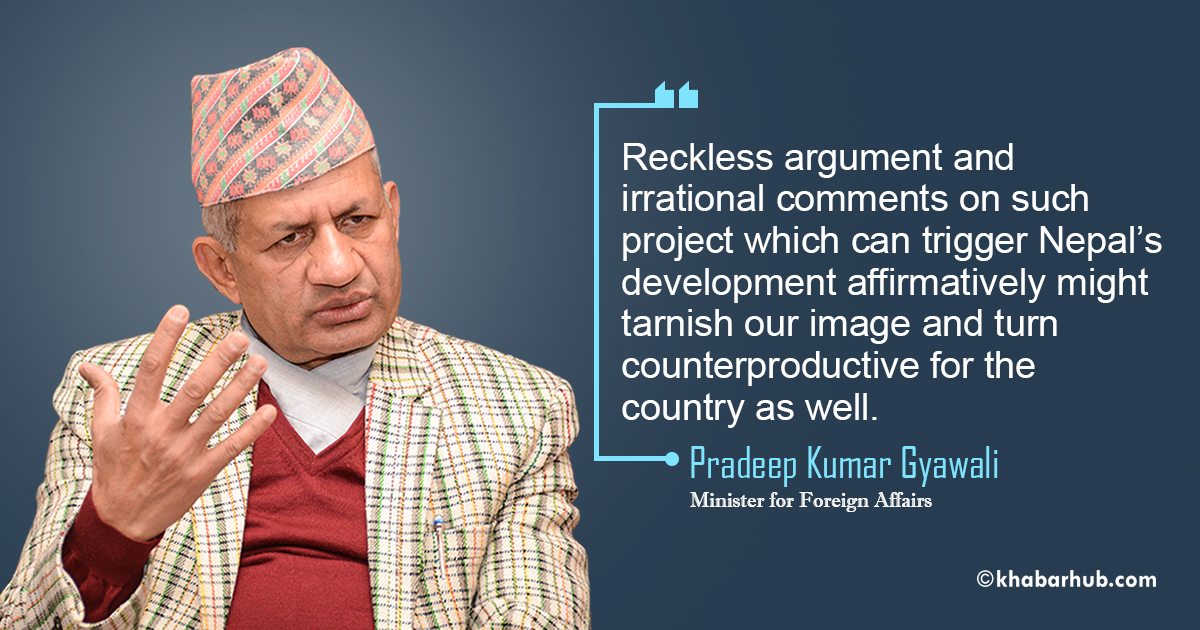



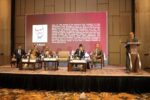


Comment